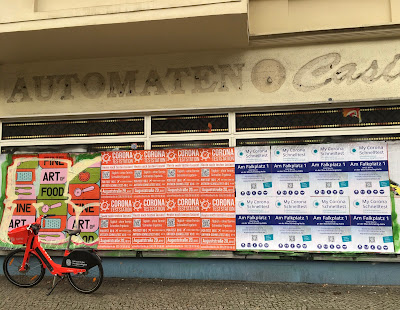
Tuesday 15 December 2020
Back to lockdown
Friday 4 December 2020
Solidarity during lockdown
There are plenty of ways to help others
Support arts and culture
Sign a petition
Donate to a charity
Human Rights Film Festival Berlin
Saturday 28 November 2020
Life in “lockdown light” – week 4
Lockdown light is not having the desired effect.
As we’re coming to the end of week four of lockdown light, it’s become increasingly evident that while the restrictive measures are working in most parts of Germany, the number of Covid-19 cases in Berlin continues to rise. In some districts, namely, Neukölln and Friedrichshain-Kreuzberg, the number of new infections has increased by as much as 60% in spite of the partial lockdown. Berliners, it would seem, are undisciplined. That doesn’t surprise me at all. As I’ve observed before, the main streets and shopping malls are crowded. Incredibly, some people are not even aware of the rules limiting social contacts.
Until recently the weather in Berlin had been fairly mild, but now it’s typical November weather. It’s cold and grey and some days it’s difficult to tell the difference between night and day. Nevertheless, people in Berlin don’t like to stay at home. Although Christmas markets are not allowed to open this year, there are alternatives. Kiosks selling Glühwein or mulled wine have popped up in several parts of the city. I’ve even seen a Vietnamese restaurant with a stall on the pavement selling Glühwein.
The current partial lockdown measures have been prolonged until 20 December and there has been some toughening of restrictions. For instance, only two households are allowed to meet up, with a maximum of five people (it used to be 10) both indoors and outdoors. But while in the rest of Germany there will be an easing of the lockdown rules to allow gatherings of up to 10 family members and friends during the Christmas holidays, in Berlin there will be no change. Luckily for large families, children under the age of 12 are excluded from these calculations. In Berlin it is not unusual to see families with four children. Having three children is almost the norm these days.
Talking of Christmas, the Advent season begins on Sunday. In Germany the tradition is to light the first of the four candles of the Adventskranz or advent wreath on the fourth Sunday before Christmas. Although you can buy them in flower shops or even supermarkets, for the past three years we’ve been making our own Adventskranz. It’s not difficult to make, but it helps if you have the right tools: a straw ring (the base), twigs, green wire (for fixing the twigs to the ring), candles, candle holders and anything you might like to use as decoration. Usually, families and friends get together on the four Sundays preceding Christmas and sit at the table with the advent wreath in the middle to drink tea or Glühwein and eat Christmas biscuits, or Plätzchen. This year, Advent season won’t be quite the same.
Finally, I have a new Netflix recommendation. It’s an animated short film called If Anything Happens I Love You. It’s only 12 minutes long, mostly in black and white, with no dialogue, but it’s extremely powerful and moving.

